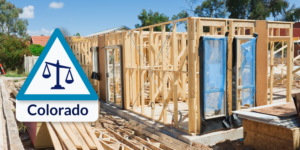
The First Regular Session of the Colorado General Assembly for 2021 convened earlier this year — and among the litany of proposed legislation that’s being considered, there is one bill of particular importance for the construction industry within the state.
HB-1167, if enacted, would cap the amount of retainage on most Colorado private construction projects to just 5%. This means greater financial security to contractors, subs, and suppliers who are struggling to keep up with upfront costs and higher retainage rates.
Current retainage laws in Colorado
Currently, there are no regulations regarding retainage practices on private projects in Colorado. This means that the amount that can be withheld and the timing of its release will be governed by the terms of the contract.
Conversely, on Colorado public works projects, there are specific statutes capping the amount that can be withheld at 5% of each progress payment. A recently introduced bill would bring retainage on private projects under statutory limits as well.
Read more: Ultimate Guide to Retainage in the Construction Industry
This isn’t the first time the Colorado legislature has considered regulating retainage on private projects. In fact, a similar bill was introduced early last year, but has since been abandoned. A shorter version of this bill, however, is currently being considered by the Colorado General Assembly.
Proposed Colorado retainage bill
Bill overview:
- Title: CO HB21-1167: Private Construction Contracts Payments
- Prime sponsors: Rep. Monica Duran, Rep. Perry Will, Sen. Julie Gonzales, & Sen. Ray Scott
- Date introduced: March 5, 2021
If enacted, this bill would add a new article (article 46) to the existing statutes governing real property in Colorado under Title 38.
Retainage caps for private projects
Under this potential new law, retainage on most private construction projects will be limited to no more than 5% of each progress payment. If enacted, these retainage requirements will apply to all construction contracts between a property owner and a contractor of at least $150,000 or more. These rules will also apply to any subcontracts or supply agreements under such a contract.
What these regulations won’t apply to is:
- Contracts for the building single-family dwellings
- Contracts for the building of multi-family dwellings of four or fewer units
- Public works projects (as retainage is already governed on CO public projects).
Timing and effect on other contractual provisions
The two main questions when discussing retainage are: A. How much can be withheld? and B. How long can it be withheld?
As mentioned above, this bill will limit the amount that can be withheld. However, that second question still remains a matter of the contract as opposed to the statute under this new proposed legislation.
Keep in mind: There are no prompt payment provisions to fall back on for private projects in Colorado, nor are there any timing requirements that would be implemented with this new law. Rather, the language of the bill specifically states that these new retainage laws will not “change, override, or invalidate” any other provisions of a contract, subcontract, or supply agreement.
Such “provisions” specifically include, but are not limited to those:
- Relating to the timing of payment (i.e pay schedules)
- Requiring satisfactory performance of the work before payment is due;
- Allowing the owner, contractor, or subcontractor to withhold or deduct from payments otherwise due to any back charges or other amounts allowed under the terms of the agreement
- Relating to a condition precedent that must be satisfied before payment becomes due (such as pay-if-paid and pay-when-paid clauses, which are enforceable in Colorado)
Lastly, under these new laws, a contract, subcontract, and/or supply agreement may still require the receipt of an executed lien waiver prior to the receipt of payment. Such provisions will not be affected by these new laws.
This Colorado retainage bill is still in its preliminary stages, and a clear “date of effectiveness” is still in flux. But if enacted, contractors, subs, and suppliers will find it easier to keep cash flow (well…flowing) on future private construction projects.
This bill has garnered a fair amount of support within the state. Jennifer Martin, Senior Director of Credit and Accounts Receivables at Kodiak Building Partners had this to say about the proposed legislation:
This bill is supported by Mountain States, NLBMDA, NAHB, and Kodiak Building Partners. If passed, this would be a big win for material suppliers and subcontractors across the state who would improve cash flow, reduce AR balances, and risk of non-payment for aged retention.
We will monitor the progress of this bill and keep you updated on any progress.